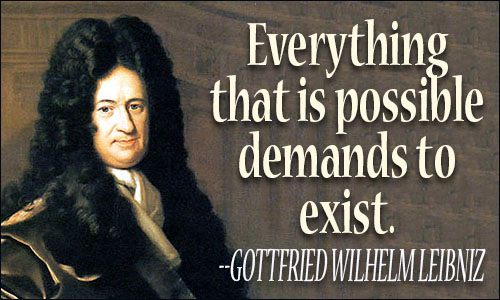GOTTFRIED WILHELM VON LEIBNIZ QUOTES
German philosopher & mathematician (1646-1716)

Notice: Undefined variable: id in /hermes/walnacweb03/walnacweb03ak/b2149/pow.notablequote/htdocs/l/includes/quoter.php on line 25
There is nothing without reason.
GOTTFRIED WILHELM LEIBNIZ
Notice: Undefined variable: id in /hermes/walnacweb03/walnacweb03ak/b2149/pow.notablequote/htdocs/l/includes/quoter.php on line 35
Studies in Physics and the Nature of the Body
Notice: Undefined variable: id in /hermes/walnacweb03/walnacweb03ak/b2149/pow.notablequote/htdocs/l/includes/quoter.php on line 61
All things in God are spontaneous.
GOTTFRIED WILHELM LEIBNIZ
"On Freedom and Possibility", Philosophical Essays
He who hasn't tasted bitter things hasn't earned sweet things.
GOTTFRIED WILHELM LEIBNIZ
Discours de métaphysique
A great doctor kills more people than a great general.
GOTTFRIED WILHELM LEIBNIZ
attributed, The New International Dictionary of Quotations
In my judgment an organic machine new to nature never arises, since it always contains an infinity of organs so that it can express, in its own way, the whole universe; indeed, it always contains all past and present times.
GOTTFRIED WILHELM LEIBNIZ
letter to de Volder, June 20, 1703
The present is pregnant with the future.
GOTTFRIED WILHELM LEIBNIZ
Philosophical Writings
The knowledge which we have acquired ought not to resemble a great shop without order, and without an inventory; we ought to know what we possess, and be able to make it serve us in need.
GOTTFRIED WILHELM LEIBNIZ
attributed, Day's Collacon
There are two kinds of truths: those of reasoning and those of fact. The truths of reasoning are necessary and their opposite is impossible; the truths of fact are contingent and their opposites are possible.
GOTTFRIED WILHELM LEIBNIZ
La monadologie
Natural religion itself, seems to decay very much. Many will have human souls to be material: others make God himself a corporeal being.
GOTTFRIED WILHELM LEIBNIZ
letter to Samuel Clarke, November 1715
God makes nothing without order, and everything that forms itself develops imperceptibly out of small parts.
GOTTFRIED WILHELM LEIBNIZ
Protogaea
What is love? To be delighted by the happiness of another.
GOTTFRIED WILHELM LEIBNIZ
Confessio Philosophi
For things remain possible, even if God does not choose them. Indeed, even if God does not will something to exist, it is possible for it to exist, since, by its nature, it could exist if God were to will it to exist.
GOTTFRIED WILHELM LEIBNIZ
"On Freedom and Possibility", Philosophical Essays
Music is a hidden arithmetic exercise of the soul, which does not know that it is counting.
GOTTFRIED WILHELM LEIBNIZ
letter to Christian Goldbach, April 17, 1712
We should like Nature to go no further; we should like it to be finite, like our mind; but this is to ignore the greatness and majesty of the Author of things.
GOTTFRIED WILHELM LEIBNIZ
letter to Samuel Clarke, 1715
Every substance is as a world apart, independent of everything else except God.
GOTTFRIED WILHELM LEIBNIZ
Discours de métaphysique
I am far removed from the opinion of those who maintain that there are no rules of goodness and perfection in the nature of things or in the ideas God has of them and who say that the works of God are good solely for the formal reason that God has made them. For, if this were so, God, knowing that he is their author, would not have had to consider them afterwards and find them good, as is testified by the Sacred Scriptures--which seem to have used such anthropomorphic expressions only to make us understand that the excellence of God's works can be recognized by considering them in themselves, even when we do not reflect on this empty external denomination which relates them to their cause. This is all the more true, since it is by considering his works that we can discover the creator. His works must therefore carry his mark in themselves.
GOTTFRIED WILHELM LEIBNIZ
Discourse on Metaphysics
Everything that is possible demands to exist.
GOTTFRIED WILHELM LEIBNIZ
De veritatibus primis
When God works miracles, he does not do it in order to supply the wants of nature, but those of grace. Whoever thinks otherwise, must needs have a very mean notion of the wisdom and power of God.
GOTTFRIED WILHELM LEIBNIZ
letter to Samuel Clarke, November 1715
There is nothing waste, nothing sterile, nothing dead in the universe; no chaos, no confusions, save in appearance.
GOTTFRIED WILHELM LEIBNIZ
La monadologie
Nature does not make leaps.
GOTTFRIED WILHELM LEIBNIZ
Nouveaux essais sur l'entendement humain